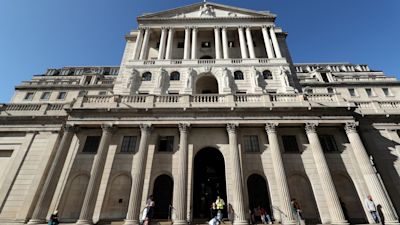Insight
Bank hikes interest rates again as war in Ukraine forces inflation higher

Inflation is high and rising unchecked. Collectively, we face a fall in our living standards on a scale we’d normally expect to see in recessions.
The Bank of England has decided it needs to act but by raising interest rates to contain rising prices, the Bank will be taking money out of the pockets of many households that are starting to feel the pinch.
The Monetary Policy Committee (MPC) voted 8 - 1 to increase Bank Rate in March, for the third time in four months, to 0.75%.
The outlook was bleak before Russia invaded Ukraine and it has darkened further.
A month ago the Bank of England forecast inflation would average 6.2% over the next twelve months - well above the 2% target - peaking at 7.25% in April.
War will send prices higher still.
The Bank now thinks CPI inflation to hit 8% at some point in the Spring and will rise “perhaps even higher”. The minutes states that new peak, at some point later this year “could be several percentage points higher”. Is inflation heading for double-digits?
Russian tanks have rolled across the bread basket of Europe, the West is trying to wean itself off Russian oil and gas. Food and energy prices have spiralled higher.
Supply chains, already stretched and strained by Covid-19, are experiencing yet another jolt.
Parts of The Black Sea are a war zone, sanctions are disrupting trade, meanwhile China is attempted to suppress another outbreak of the virus by locking down cities which export goods globally. The rebalancing of consumer spending from goods to services has “stalled”.
Increasing Bank Rate will not make wheat and oil more abundant, it won’t smooth the passage of shipping vessels. The UK is being hit by a wave of inflation which is essentially imported and therefore unavoidable. It will inevitably make us poorer.
The Bank of England has its eyes on the horizon. It is acting to prevent inflation being generated domestically.
The UK labour market is tight. The economy is awash with vacancies which many companies report they are struggling to fill. The unions are on the march, demanding higher pay as real incomes fall.
The Bank’s worry is that expectations of ever-rising prices becomes embedded in pay settlements - that higher pay forces companies to raise their prices which in turn triggers demands for higher pay.
“We do need to see restraint in the growth of wages,” the Governor of the Bank of England, Andrew Bailey, told ITV News last month. It was an honest attempt to explain the Bank’s thinking but the comments were widely criticised as insensitive.
'We have to use our tools to prevent this getting worse,' Bank of England Governor Andrew Bailey said as he acknowledged that the poorest households will be hit hard by energy bill increases
Survey data suggests that households and businesses have begun to expect higher inflation but the Bank judges that such expectations “remain well anchored”. The MPC is determined to keep them nailed down.
The decision to hike Bank Rate will immediately affect the interest that banks and building societies charge to borrowers and offer to savers.
2.2 million homeowners on variable rate mortgages will instantly feel things tighten.
UK Finance calculates that repayments for the average tracker deal will rise by £25 a month. This is on top of increases in December and February. Such a mortgage is now £67 a month more expensive to service. The increases are starting to add up.
Seven million homeowners on fixed rate mortgages are insulated for now but more than half of those deals expire over the next three years.
House prices continue to head north but banks are charging more to borrow. The market cannot defy gravity.
Savers may feel pleased but saving rates are not increasing by anything like the rate of inflation. Money in the bank is losing its value.
Whither interest rates? Investors are betting that Bank Rate will reach 2% by the end of the year.
“Some further modest tightening in monetary policy may be appropriate in the coming months,” says the Bank. The tone has softened and suggests markets may have got over-excited.
What happens next can only be guessed at.
We keep talking about a “hit” to our living standards but, in truth, it has yet to be felt yet. In April, energy bills will rise sharply, tax increases take effect and the impact of the war will start to be felt.
The road ahead looks really grim.